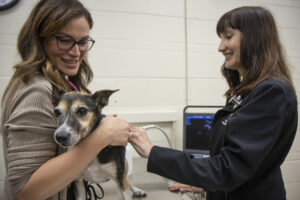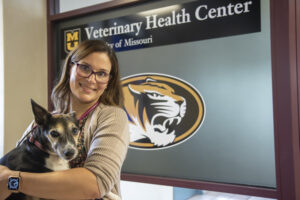Published on
Updated on
Published 11/10/2022
Photos by Karen Clifford
In March 2021, Steve Kasper’s 9-year-old beagle mix, Spirit, began refusing to go on her daily 4-mile walk. Suddenly, Spirit was easily getting winded. Based on her clinical picture and the appearance of her lungs on radiographs, her veterinarian suspected the dog had contracted a fungal infection and referred Kasper, of Battlefield, Missouri, and Spirit to the MU Veterinary Health Center.

Aida Vientós-Plotts, DVM, PhD, DACVIM, assistant professor of small animal internal medicine, ran a series of diagnostic tests on Spirit including a computed tomography (CT) scan of her chest. Based on those findings, she suspected that the dog had a condition called cryptogenic organizing pneumonia and began treating her with steroids while awaiting confirmation from a lung biopsy.
“Cryptogenic organizing pneumonia is a type of immune mediated lung disease that is rarely recognized in dogs and cats for two reasons,” Vientós-Plotts explained. “It requires a lung biopsy for definitive diagnosis, and it is not often on veterinarian’s differential list.”
Spirit remained hospitalized for almost two weeks while Vientós-Plotts and the VHC’s Internal Medicine Service treated her with steroids. Today, Spirit remains on a low dose of prednisone and returns to the VHC periodically for a physical and CT scans to ensure her disease is well controlled.
“She acts like her normal self now,” Kasper said.
Without Vientós-Plotts’ expertise and the sophisticated diagnostic capabilities available to VHC patients, Spirit’s story could have had an unhappy ending. To provide the best possible outcomes to patients like Spirit, Vientós-Plotts, and Carol Reinero, DVM, PhD, DACVIM, professor of small animal internal medicine, determined to establish a new clinical specialty service.
Last month they launched the Respiratory and Aerodigestive Disorders Specialty Clinic, also known as the BREATHE Clinic, focused on diagnosing and treating dogs and cats with respiratory and swallowing disorders.
“The inspiration behind the BREATHE Clinic is our patients and the desire to impact dogs and cats with respiratory and aerodigestive disorders,” Reinero explained. “My career in respiratory medicine began with a cat named Sophie. She had a disease that in retrospect I couldn’t diagnose because it hadn’t been described yet. Not knowing how to help her set me on the path of making respiratory medicine my career focus, and a few years later, I was part of the team that ended up describing and reporting her disease in the veterinary literature.”
Reinero recalled other patients whose stories compelled her to want to advance diagnoses and treatment of respiratory conditions.
“My canine patient Emmie was another inspiration. She had a respiratory disease that should have shortened the quantity and quality of her life, but with the persistence of her owners and with close care and monitoring, she never let her illness affect the amazing life she had. Dodger was a dog who had been given a death sentence and came to me for a second opinion. I diagnosed him with a disease that was not reported in the veterinary literature. With aggressive therapy, he was cured. He lived for the births of his two human siblings and died at an old age of an unrelated disease. There are so many other patients that have helped me to build my expertise and in turn, have created their own legacies to benefit other canine and feline patients.”
Working in academia, Reinero has also trained and mentored promising future specialists, some who have been leaving their own marks in the field of respiratory medicine.
“One of them, Dr. Vientós-Plotts, joined our faculty in 2018,” Reinero said. “Together, we set out to establish the BREATHE Clinic with the goal of using our expertise to push the envelope and help dogs and cats that may not be able to find help elsewhere, either because other veterinarians had exhausted the diagnostics and treatments they have access to, or because there are many respiratory diseases that have not yet been discovered and characterized yet.”
The BREATHE Clinic helps dogs and cats with respiratory conditions like chronic cough, abnormal breathing noises like snoring, exercise intolerance, collapsing trachea, and brachycephalic obstructive airway syndrome. Digestive and swallowing disorders, like megaesophagus, are also sometimes responsible for respiratory problems and can be treated, Reinero said.
The VHC’s advanced imaging capabilities, in conjunction with the ability to collaborate with a broad spectrum of other specialists at the VHC, including those working in anesthesia, cardiology, critical care, dentistry, soft tissue surgery and radiology, and partner with the patients’ referring veterinarians, position the clinic to provide state-of-the-art care. The availability of advanced imaging, like fluoroscopy, which allows BREATHE Clinic clinicians to assess dynamic processes like swallowing and breathing, and other diagnostic equipment, is crucial for diagnosing respiratory and aerodigestive disorders.
“As an example, in the span of a single breath, the VHC’s CT scanner can obtain images of a cat’s entire chest,” Vientós-Plotts said. “As another illustration, when we perform videofluoroscopic swallow studies, we are using kennels developed and patented by one of our key collaborators at MU to allow for unrestrained, free-feeding behaviors to be observed.”
“Compared to many other subspecialties, respiratory medicine is still in its infancy,” Reinero said. “There are many respiratory diseases that are widely recognized and successfully treated in general and specialty practice. However, if our patients are anything like humans, we believe there may be up to a couple hundred disorders and sub-disorders yet to be described in veterinary medicine. It takes a multidisciplinary team of clinicians, diagnostic imaging specialists, and pathologists who have access to state-of-the-art diagnostics, and the time, expertise, and drive to describe and characterize new diseases. We have that team of collaborators within the University of Missouri and externally.”
Having more than one respiratory disease at a time is also common, so even correct diagnosis and treatment of one disease may not lead to an overall clinical benefit. If a diagnosis can’t be made or if dogs or cats fail to respond to appropriate therapy for that disease, it is likely they need more sophisticated testing and consideration of other less common or poorly characterized diseases, Reinero explained.
“Aerodigestive disorders, aside from aspiration pneumonia, are relatively recently described but are not on the radar of many veterinarians. Based on work at Mizzou using fluoroscopy, aerodigestive diseases have been found to be common, occurring in more than three-quarters of the dogs we see. This means not only the respiratory disease, but also the digestive tract disorder needs to be diagnosed and treated. This is one of our areas of expertise.”
Treatment at the VHC begins with a questionnaire crafted to gather as much information as possible about the patient, their medical history and client concerns ahead of time. This allows the clinicians to understand the clinical context of the respiratory or aerodigestive disease and start shaping consideration of possible disorders.

During the patient’s initial visit, they undergo a comprehensive physical examination. The exam involves an evaluation of the respiratory and gastrointestinal tract, including an analysis of an animal’s oxygenation levels. Clients are provided recommendations for any additional diagnostics that may be needed. These may include blood tests, imaging, lung sampling, and tests for infectious diseases. Once the evaluation is complete and all the results are received, a treatment plan and management recommendations are provided.
“We see a smaller number of cases per day than other specialty services,” Vientós-Plotts said, “This allows us more time to spend time with our clients and patients. Dr. Reinero and I are board-certified internal medicine specialists trained to look at the entire clinical picture, including how diseases of other organ systems might be affecting overall health.”
Vientós-Plotts added that another goal is to offer clinical trials for specific diseases focused on improving diagnostic testing and applying new treatments.
“These may provide some options not available elsewhere and in addition, may help offset some of the costs to clients. We currently have two such clinical trials and are seeking research funds or donations for others,” she said.
Reinero and Vientós-Plotts said they hope that by establishing this clinic they will have a positive impact on the lives of patients that may have treatable diseases, not just by treating cases themselves, but also by using these cases to teach other veterinarians and veterinary students, and conducting research that will advance respiratory medicine in the future.
More information about the BREATHE CLINIC, including which patients may benefit from treatment, how to make an appointment, and what to expect from a visit, can be found on the Small Animal Internal Medicine Service webpage.